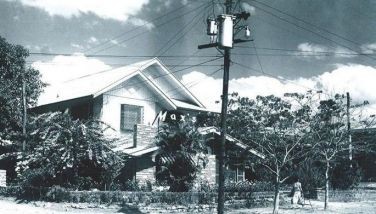Cooptition

April 8, 2006 | 12:00am
It is not quite true that Meralco has yielded to the Electric Power Industry Reform Act (EPIRA) by allowing consumers who use at least 1 megawatt of power each month to choose its supplier from among the power generation plants.
Therefore it is not quite true that consumers stand to significantly benefit from lower power costs because of this.
Only 25 percent of Meralco’s customers consume 1 megawatt of power monthly. Although they may choose their supplier, the range of choice is rather limited since a truly competitive power supply market could not evolve in the absence of a fully operational Wholesale Electricity Spot Market (WESM). If the supply differential is not truly significant, especially since Meralco monopolizes electricity retail in the metropolitan area and over 70% of the Luzon grid, the big consumers may not bother to exercise their option at all.
If that happens, Meralco’s gesture to reform might be an empty one after all.
Our power predicament is a bit of a Gordian Knot.
Meralco not only enjoys retail monopoly over the most lucrative electricity market. The owners of Meralco are also owners of power plants that supply Meralco. The retail monopoly therefore has a conflict-of-interest situation: it will be inclined to order its supply from its own power producers in order to keep the latter running at Maximum Efficient Quantity (MEQ). Or, should it take its supply from other producers, Meralco affiliated generators will still charge take-or-pay penalties that will be passed on to consumers.
Having ensured the survival of her affiliate companies in the power supply sector, Meralco then orders from the Napocor (government, we will note, is part-owner of Meralco). Napocor is, notoriously, not the most efficient producer of electricity. More than that, history has shown that Napocor could price its power supply beneath the cost of production when it is politically expedient to do so.
From 2002 to 2004, Napocor sold power at great financial loss so that the mass of electricity consumers would be pleased with cheap electricity on the eve of elections. The public sector ended up absorbing the losses.
If a WESM was in place, such politicized situation would never happen, of course.
Which brings us to a defect in the EPIRA. Before a WESM could be established, Napocor should have shed off its power plants, bringing forth a competitive power supply market. The EPIRA defines that as a situation where private, competing power generators comprise 70 percent of the market.
In the absence of the WESM, there will be no competitive pricing in the power sector. Filipinos will continue to be burdened by the high power costs associated with long years of monopoly and inefficiency.
Meralco’s plan to open access for customers consuming 1 megawatt a month is not a step towards the WESM. It is a cosmetic measure that might, in fact, delay privatization of the Napocor assets and thus delay the WESM.
Consumers will still labor under the high cost of power brought forth by a regime of monopoly and inefficiency.
The reason for this is that, under present conditions, acquiring power plants that will operate on a purely merchant basis is a high risk proposition. Between Meralco-affiliated power plants and the propensity of Napocor plants to politically-dictated pricing, few banks would lend money to entrepreneurs willing to invest in acquiring privatized Napocor assets.
Since no banks would lend money to companies willing to acquire Napocor assets, the privatization program is delayed for lack of interest. The present onerous regime of retail monopoly and inefficient power generation is maintained.
If Meralco is truly interested in performing a patriotic act, it should go beyond this empty gesture of allowing free access to customers consuming 1 megawatt per month.
What Meralco should do is to agree to bilateral supply contracts with firms that will acquire privatized Napocor assets. The supply contracts, which will hold until a WESM is finally established, will make privatization a bankable proposition, ensuring a buyer for the power generated by the privatized plants. Firms venturing into power generation will be encouraged by a more hospitable market environment.
By doing so, Meralco will be ensuring the viability of power plants other than those of its affiliated companies. That will create an energy market that is transparent, free of transfer pricing and truly competitive.
There is a modern concept about contested markets. It is called "cooptition" and is characterized by cooperation among competitors to ensure that the best competitive field is achieved.
In conditions of "cooptition", competing firms do not undermine the viability of competitors by creating a policy environment that encourage monopoly and discourage fair play. On the contrary, they encourage as level a playing field as possible so that competitors will rely on excellence to bring the best to consumers at least cost.
In conditions of "cooptition", consumers will invariably benefit. Competing firms will be rewarded for their excellence, their ability to be more efficient than the next guy and for their innovativeness in management.
It might take time for Meralco to understand "cooptition." It is always easier to maintain lopsided policies that inhibit true competition and foster monopolies.
Until Meralco is ready to assist in making firms that will compete with its affiliates more viable, no reform will happen in the power sector. Inefficiency will still rein. The economy will continue to be hostage to an inefficient energy regime. The country will continue to face the specter of power shortages arising out of lack of investments in the power sector.
Until Meralco understands "cooptition", it should desist from mislabeling its version of "open access" as a step towards reform. It is not.
In fact, it compounds the problems hounding the privatization of Napocor assets by undermining the financial viability of firms that could compete with Meralco affiliates. It encourages those affiliates to continue with their inefficient generation. It traps us in the present inefficient energy regime.
Therefore it is not quite true that consumers stand to significantly benefit from lower power costs because of this.
Only 25 percent of Meralco’s customers consume 1 megawatt of power monthly. Although they may choose their supplier, the range of choice is rather limited since a truly competitive power supply market could not evolve in the absence of a fully operational Wholesale Electricity Spot Market (WESM). If the supply differential is not truly significant, especially since Meralco monopolizes electricity retail in the metropolitan area and over 70% of the Luzon grid, the big consumers may not bother to exercise their option at all.
If that happens, Meralco’s gesture to reform might be an empty one after all.
Our power predicament is a bit of a Gordian Knot.
Meralco not only enjoys retail monopoly over the most lucrative electricity market. The owners of Meralco are also owners of power plants that supply Meralco. The retail monopoly therefore has a conflict-of-interest situation: it will be inclined to order its supply from its own power producers in order to keep the latter running at Maximum Efficient Quantity (MEQ). Or, should it take its supply from other producers, Meralco affiliated generators will still charge take-or-pay penalties that will be passed on to consumers.
Having ensured the survival of her affiliate companies in the power supply sector, Meralco then orders from the Napocor (government, we will note, is part-owner of Meralco). Napocor is, notoriously, not the most efficient producer of electricity. More than that, history has shown that Napocor could price its power supply beneath the cost of production when it is politically expedient to do so.
From 2002 to 2004, Napocor sold power at great financial loss so that the mass of electricity consumers would be pleased with cheap electricity on the eve of elections. The public sector ended up absorbing the losses.
If a WESM was in place, such politicized situation would never happen, of course.
Which brings us to a defect in the EPIRA. Before a WESM could be established, Napocor should have shed off its power plants, bringing forth a competitive power supply market. The EPIRA defines that as a situation where private, competing power generators comprise 70 percent of the market.
In the absence of the WESM, there will be no competitive pricing in the power sector. Filipinos will continue to be burdened by the high power costs associated with long years of monopoly and inefficiency.
Meralco’s plan to open access for customers consuming 1 megawatt a month is not a step towards the WESM. It is a cosmetic measure that might, in fact, delay privatization of the Napocor assets and thus delay the WESM.
Consumers will still labor under the high cost of power brought forth by a regime of monopoly and inefficiency.
The reason for this is that, under present conditions, acquiring power plants that will operate on a purely merchant basis is a high risk proposition. Between Meralco-affiliated power plants and the propensity of Napocor plants to politically-dictated pricing, few banks would lend money to entrepreneurs willing to invest in acquiring privatized Napocor assets.
Since no banks would lend money to companies willing to acquire Napocor assets, the privatization program is delayed for lack of interest. The present onerous regime of retail monopoly and inefficient power generation is maintained.
If Meralco is truly interested in performing a patriotic act, it should go beyond this empty gesture of allowing free access to customers consuming 1 megawatt per month.
What Meralco should do is to agree to bilateral supply contracts with firms that will acquire privatized Napocor assets. The supply contracts, which will hold until a WESM is finally established, will make privatization a bankable proposition, ensuring a buyer for the power generated by the privatized plants. Firms venturing into power generation will be encouraged by a more hospitable market environment.
By doing so, Meralco will be ensuring the viability of power plants other than those of its affiliated companies. That will create an energy market that is transparent, free of transfer pricing and truly competitive.
There is a modern concept about contested markets. It is called "cooptition" and is characterized by cooperation among competitors to ensure that the best competitive field is achieved.
In conditions of "cooptition", competing firms do not undermine the viability of competitors by creating a policy environment that encourage monopoly and discourage fair play. On the contrary, they encourage as level a playing field as possible so that competitors will rely on excellence to bring the best to consumers at least cost.
In conditions of "cooptition", consumers will invariably benefit. Competing firms will be rewarded for their excellence, their ability to be more efficient than the next guy and for their innovativeness in management.
It might take time for Meralco to understand "cooptition." It is always easier to maintain lopsided policies that inhibit true competition and foster monopolies.
Until Meralco is ready to assist in making firms that will compete with its affiliates more viable, no reform will happen in the power sector. Inefficiency will still rein. The economy will continue to be hostage to an inefficient energy regime. The country will continue to face the specter of power shortages arising out of lack of investments in the power sector.
Until Meralco understands "cooptition", it should desist from mislabeling its version of "open access" as a step towards reform. It is not.
In fact, it compounds the problems hounding the privatization of Napocor assets by undermining the financial viability of firms that could compete with Meralco affiliates. It encourages those affiliates to continue with their inefficient generation. It traps us in the present inefficient energy regime.
BrandSpace Articles
<
>
- Latest
- Trending
Trending
Latest
Recommended






















